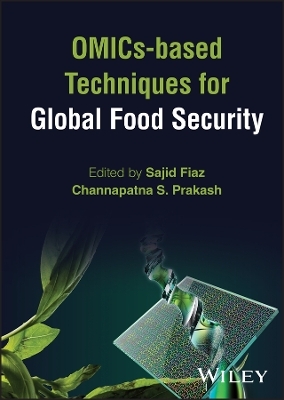
OMICs-based Techniques for Global Food Security
John Wiley & Sons Inc (Verlag)
978-1-394-20912-5 (ISBN)
OMICS-based Techniques for Global Food Security provides an in-depth understanding of the mechanisms of OMICs techniques for crop improvement, details how OMICs techniques can contribute to identifying genes and traits with economic benefits, and explains how to develop crop plants with improved yield, quality, and resistance to stresses through genome editing technologies, providing evidence on the developments of climate resilient crops via applications of genome editing techniques throughout.
The text covers the application of OMICs in crop plants, the integration of bioinformatics and multi-OMICs for precision breeding, de-novo domestication, CRISPR/Cas system for crop improvement, hybrid seed production, transgene free breeding, regulation for genome edit crops, bioinformatics and genome editing, and other topics related to OMICs and genome editing.
The text also includes a chapter on global regulations for genome edited crops, and explains how these regulations influence novel plant breeding techniques in their adopted countries.
Edited by two highly qualified academics, OMICs-based Techniques for Global Food Security covers topics such as:
Crops genome sequencing and their application for crop improvement, and functional characterization of cereal genome
The role of OMICs-based technologies in plant sciences and utilization of different multi-OMICs approaches for crop improvement
Genomic database and genetic resource of cereals, speed breeding for rapid crop improvement, and evolution of genome editing technologies
CRISPR system discovery, history, and future perspective, and CRISPR/Cas system for biotic and abiotic stress resistance in cereals
Providing a collection of recent literature focusing on developments and applications of OMICs-based technologies for crop improvement, OMICs-based Techniques for Global Food Security is an important read for plant breeders, molecular biologists, researchers, postdoctoral fellows, and students in disciplines for developing crops with high yield and nutritional potential.
Sajid Fiaz, Assistant Professor, Department of Plant Breeding and Genetics, The University of Haripur, Pakistan. Professor Fiaz obtained his PhD in Crop Genetics and Breeding from the Chinese Academy of Agricultural Sciences, China, in 2019. Channapatna S. Prakash, Dean, College of Arts and Sciences, Tuskegee University, Kenney Hall, Tuskegee, USA. Professor Prakash has served on the USDA’s Agricultural Biotechnology Advisory Committee and the Advisory Committee for the Department of Biotechnology for the Government of India.
List of Contributors xv Preface xxiii
1 Crop Genome Sequencing and their Application for Crop Improvement 1
Hafiz Ghulam Muhu-Din Ahmed, Yawen Zeng, Xiaomeng Yang, Noor Fatima, and Anns Faisal
2 Functional Characterization of Cereal Genomics 27
Muhammad Aslam, Usman Ahmad, Ramala Masood Ahmad, and Ayesha Aslam
3 Role of OMICS-Based Technologies in Plant Sciences 45
Shumaila Ijaz, Javed Iqbal, Banzeer A. Abbasi, Tabassum Yaseen, Shazia Rehman, Mohsin Kazi, Lubna Ansari, and Tariq Mahmood
4 OMICS-Based Knowledge for Achieving Food and Nutritional Security 67
Shanza Nasar, Murad Muhammad, Ejaz Hussain Siddiqi, Muhammad Majeed, Nimrah Ameen, Shahid Ullah, Shazia Kousar, and Muhammad Abdullah
5 Utilization of Multi-Omics Approaches for Crop Improvement 91
Aiman Hina, Asim Abbasi, Muhammad Arshad, Safa Imtiaz, Sehar Shahid, Iqra Bibi, Hayssam M. Ali, and Nader R. Abdelsalam
6 Genomic Databases and Genetic Resources of Cereals 123
Rashid M. Rana, Azeem I. Khan, Munir Ahmad, Fahad M. Wattoo, Mohammad U. Ijaz, and Muhammad Hammad
7 Speed Breeding for Rapid Crop Improvement 139
Fahad M. Wattoo, Taimoor Khalid, Rashid M. Rana, and Farooq Ahmad
8 CRISPR System Discovery, History, and Future Perspective 159
Faizan Ali, Akhtar Hameed, Abdul Rehman, Sohaib Sarfraz, Nasir A. Rajput, and Muhammad Atiq
9 The Evolution of Genome-Editing Technologies 171
Hafiz I. Ahmad, Noreena Bibi, and Abdul Jabbar
10 CRISPR/Cas-Mediated Biotic Stress Resistance in Cereals for Achieving Zero Hunger 189
Asim Abbasi, Aiman Hina, Amna Chaudhry, Tasmeya Ishfaq, Wafa A. H. Alkherb, Asad Aslam, Nishat Ishfaq Abbasi, and Hayssam M. Ali
11 CRISPR/Cas System for Achieving Abiotic Stress Tolerance 213
Afifa Younas, Nadia Riaz, Madiha Rashid, Aasma Tufail, Sajjad Hyder, and Zahra Noreen
12 Technological Innovations for Abiotic Stress Resistance in Horticultural Crops 233
Yumna Ahmad, Zubaria Haakim, Javed Iqbal, Banzeer A. Abbasi, Tariq Mahmood, and Mohsin Kazi
13 Novel CRISPR-Based Genome Editing Systems for Crop Improvement 245
Eesha A. Khaliq, Naila Perveen, Daima Hamid, Mariam Hameed, Muhammad Asif, and Muhammad Arif
14 Precise Genome Editing of Plants Through Base and Prime Editor 269
Saif Alharbi, Mohammed Al-Dakhil, and Fahad S. Alotaibi
Index 287
| Erscheinungsdatum | 04.05.2024 |
|---|---|
| Verlagsort | New York |
| Sprache | englisch |
| Maße | 189 x 251 mm |
| Gewicht | 709 g |
| Themenwelt | Weitere Fachgebiete ► Land- / Forstwirtschaft / Fischerei |
| ISBN-10 | 1-394-20912-6 / 1394209126 |
| ISBN-13 | 978-1-394-20912-5 / 9781394209125 |
| Zustand | Neuware |
| Informationen gemäß Produktsicherheitsverordnung (GPSR) | |
| Haben Sie eine Frage zum Produkt? |
aus dem Bereich


